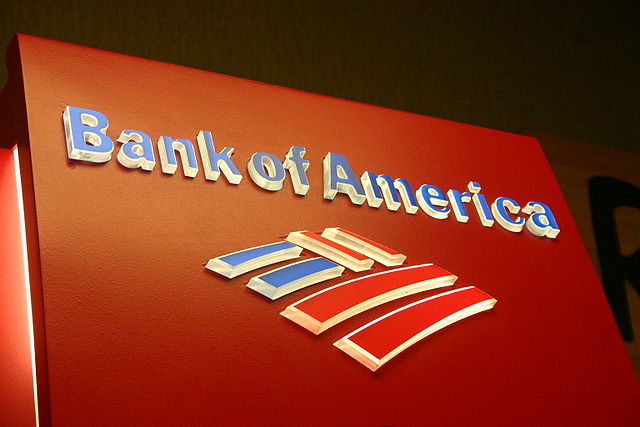Banking, finance, and taxes
What $16.65 Billion Really Means to Bank of America
Published:
Last Updated:
Bank of America Corp. (NYSE: BAC) saw its shares rally late on Wednesday on news that it has reached a $17 billion settlement with the U.S. Department of Justice. Shares were also higher by well over 1% on Thursday morning, after the terms of the settlement were seen as far less than initial reports may have indicated — at $16.65 billion, with “only” $9.65 billion being cash. A sum of $16.65 billion would be catastrophic for almost any non-bank out there, but not for the “too big to fail” banks. So, 24/7 Wall St. wants to know, what exactly does $16.65 billion, or $9.65 billion in cash, really mean for Bank of America?
The formal press release from Bank of America shows that the bank settlement is expected to reduce third-quarter earnings (pretax) by some $5.3 billion and will negatively impact earnings by roughly $0.43 per share. As Thomson Reuters has its consensus earnings estimate at $0.31 per share, that means a loss is coming this quarter.
In the deal, Bank of America will pay a total of $9.65 billion in cash and the other $7.0 billion will be in consumer relief. The cash portion consists of a $5.02 billion civil monetary penalty and $4.63 billion in compensatory remediation payments.
READ ALSO: The 10 Most Dominant Warren Buffett Stocks
Again, what exactly does this mean to Bank of America and its shareholders?
The first issue to consider is that its market cap is roughly $165 billion. So, that is roughly 10% of the company’s entire equity value on the whole settlement amount. The cash portion represents less than 6% of the market cap.
The real issue is what it means on the balance sheet. On that front, Bank of America has $2.17 trillion in assets. So it is not even a 0.5% hit to the balance sheet on an asset basis, if you just consider the cash portion of the fine. Still, if you back out all the liabilities, the bank’s total equity is $237.4 billion and its net tangible assets are listed as $162.5 billion.
Another way to look at the $16.65 billion or the $9.65 billion is against income. Last quarter’s revenue at Bank of America was $24.675 billion and income was $2.29 billion. If you compare the $17 billion to 2013, the bank had total revenue of $101.7 billion and net income applicable to its shareholders of almost $10.1 billion.
READ ALSO: Top Analyst Large and Mid-Cap Bank Stock Picks After Earnings Season
Now, what does this mean when you compare it to the actual purchase of Countrywide? Bank of America paid $4 billion to acquire Countrywide. The press release of the deal looks rather silly now because it doesn’t say anything about assuming billions and billions of endless liabilities. In fact, the old press release said:
The purchase is expected to close in the third quarter and to be neutral to Bank of America earnings per share in 2008 and accretive in 2009, excluding merger and restructuring costs. Bank of America expects $670 million in after-tax cost savings in the transaction, or 11 percent of the expense base of the two companies’ mortgage operations. About one third of those savings would come in 2009, two thirds would be realized in 2010 and savings would be fully realized in 2011.
As far as the Merrill Lynch acquisition is concerned, the bank said at the time of its closing:
Bank of America expects to achieve $7 billion in pre-tax expense savings, fully realized by 2012. Cost reductions will come from a range of sources, including the elimination of positions announced on December 11, and the reduction of overlapping technology, vendor and marketing expenses. In addition, the company is expected to benefit by leveraging its broad product set to deepen relationships with existing Merrill Lynch customers.
A settlement of this size is massive on the surface. Still, it turns out that the headlines often are much more exaggerated than the real costs. This settlement is with multiple federal agencies and with six states. Sadly, the settlement is shown to be primarily related to conduct that occurred at Countrywide and Merrill Lynch prior to Bank of America’s acquisition of those entities.
READ ALSO: Oppenheimer Says Buy the Big 3 Banks Instead of Fully Valued Regionals
The settlement does not cover potential criminal claims, potential claims against individuals and certain purported whistle-blower actions. In addition, it does not cover the O’Donnell case (High Speed Swim Lane).
Bank of America shares were up 1.5% at $15.75 in mid-morning trading on Thursday, against a 52-week range of $13.60 to $18.03. The consensus analyst price target from Thomson Reuters is $17.32.
Retirement can be daunting, but it doesn’t need to be.
Imagine having an expert in your corner to help you with your financial goals. Someone to help you determine if you’re ahead, behind, or right on track. With SmartAsset, that’s not just a dream—it’s reality. This free tool connects you with pre-screened financial advisors who work in your best interests. It’s quick, it’s easy, so take the leap today and start planning smarter!
Don’t waste another minute; get started right here and help your retirement dreams become a retirement reality.
Thank you for reading! Have some feedback for us?
Contact the 24/7 Wall St. editorial team.